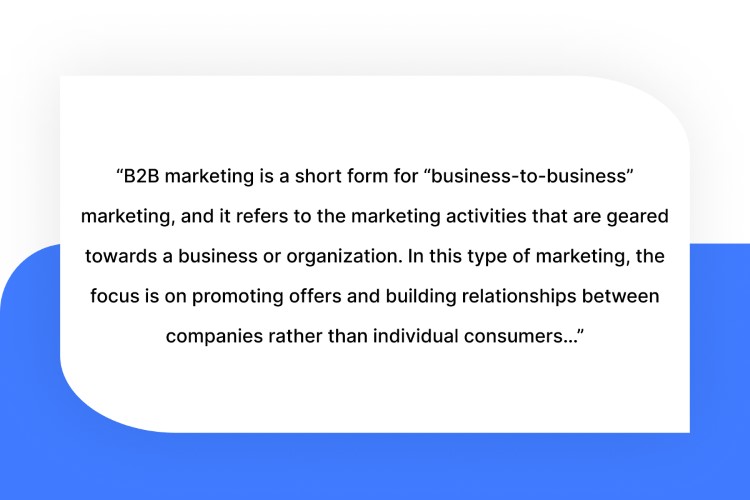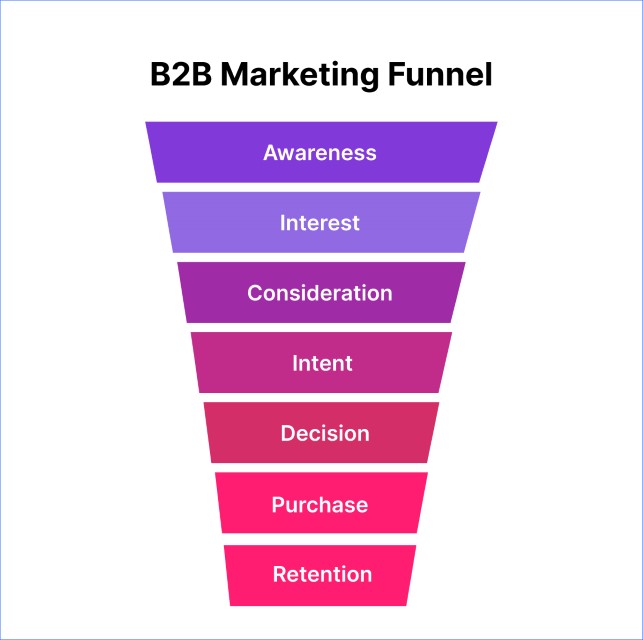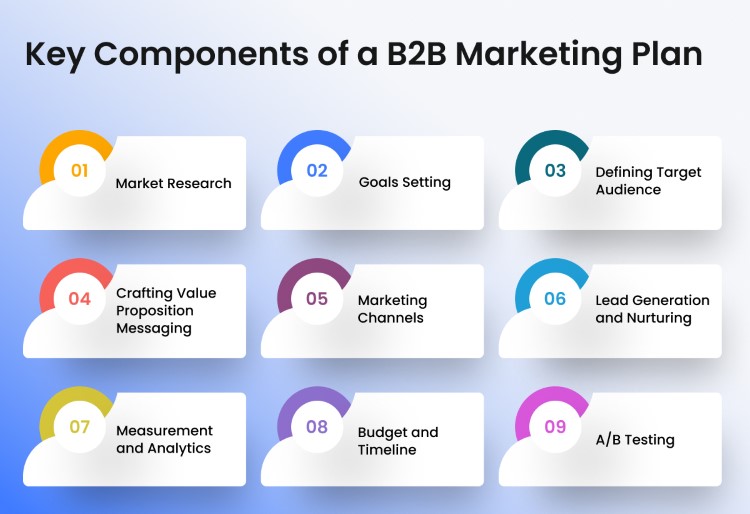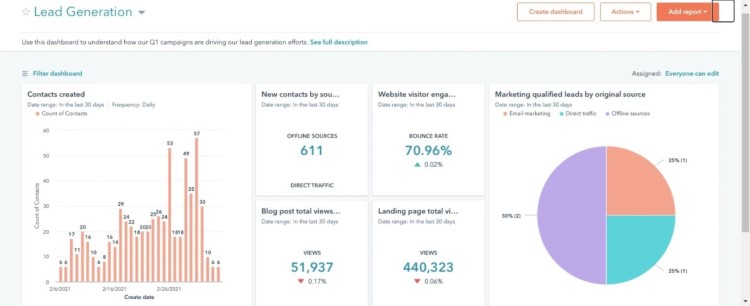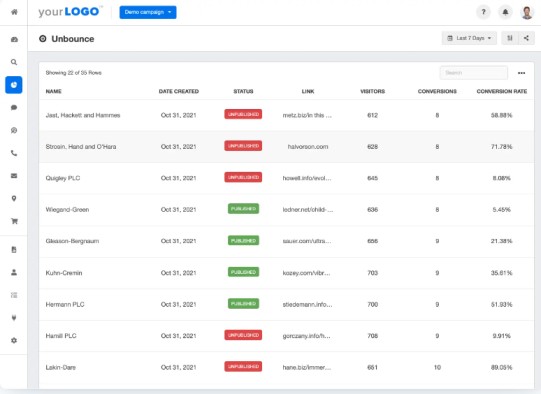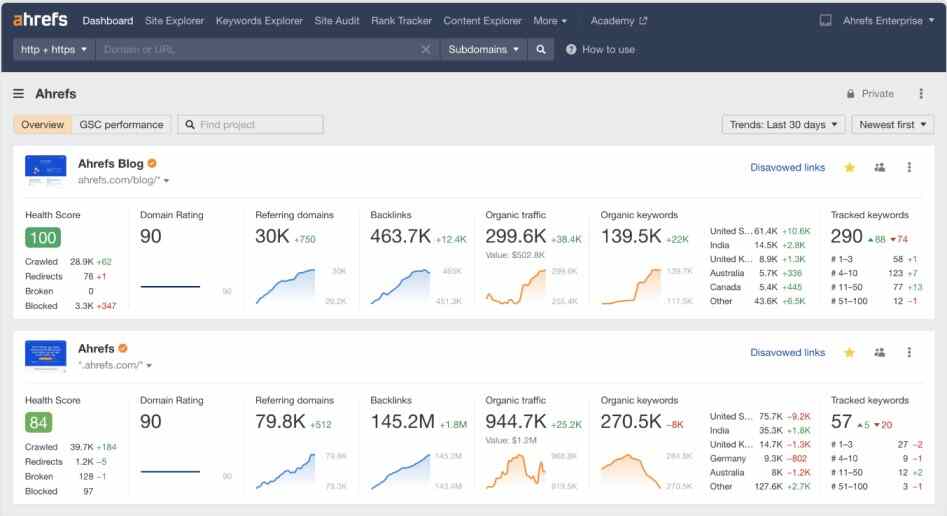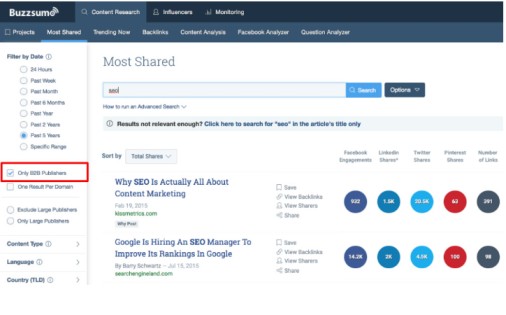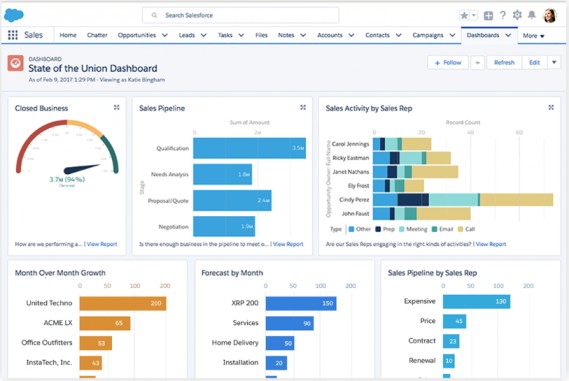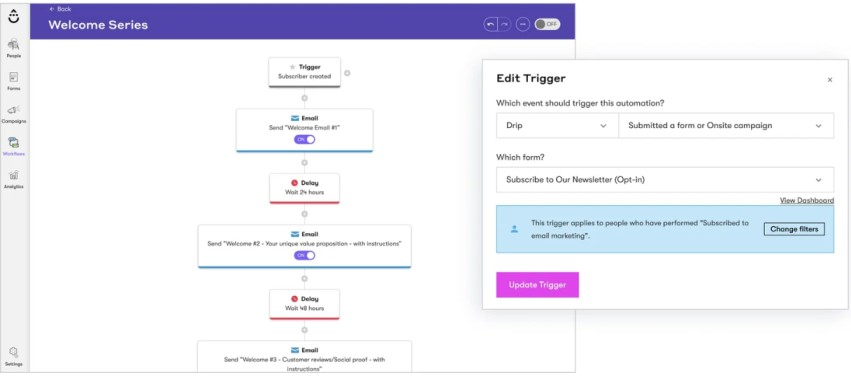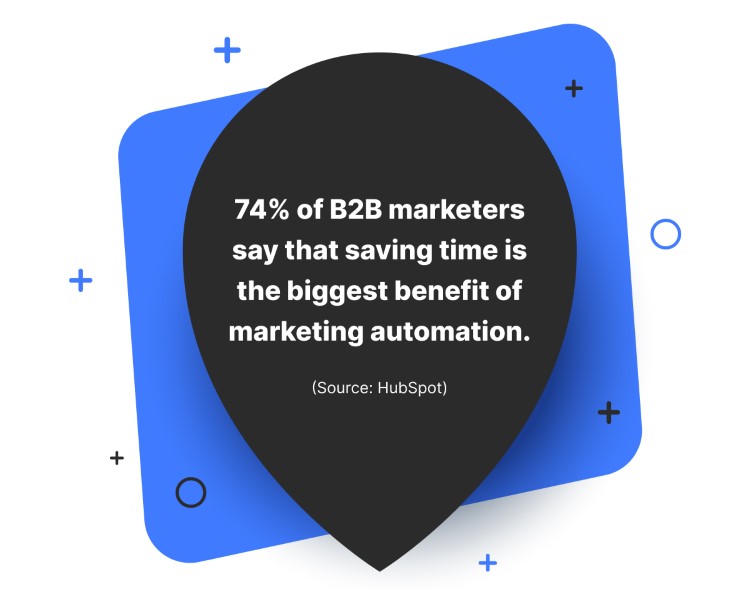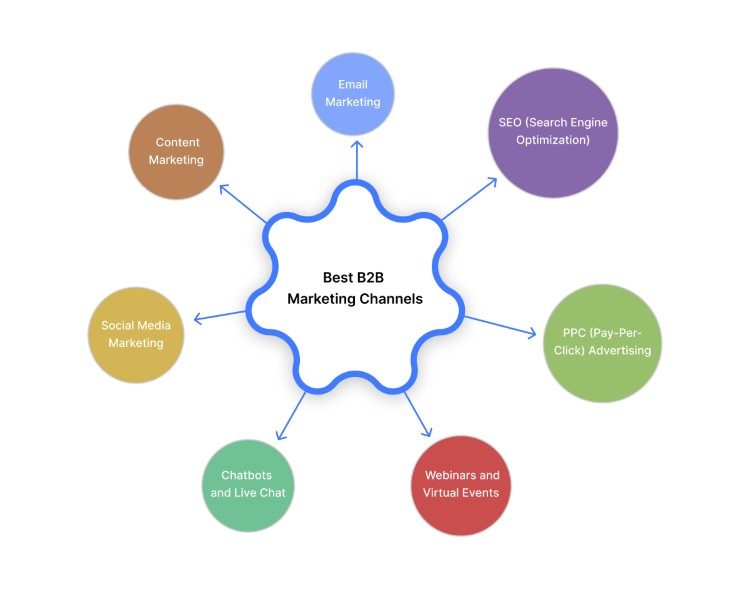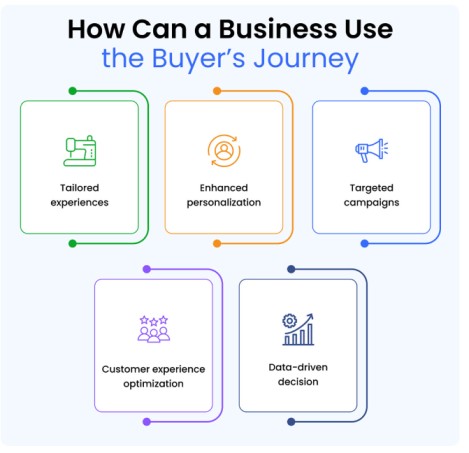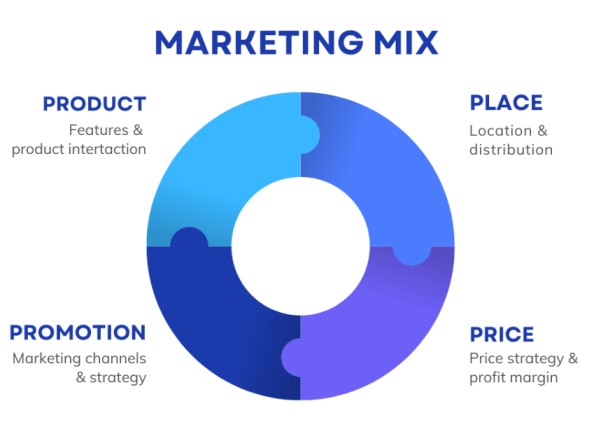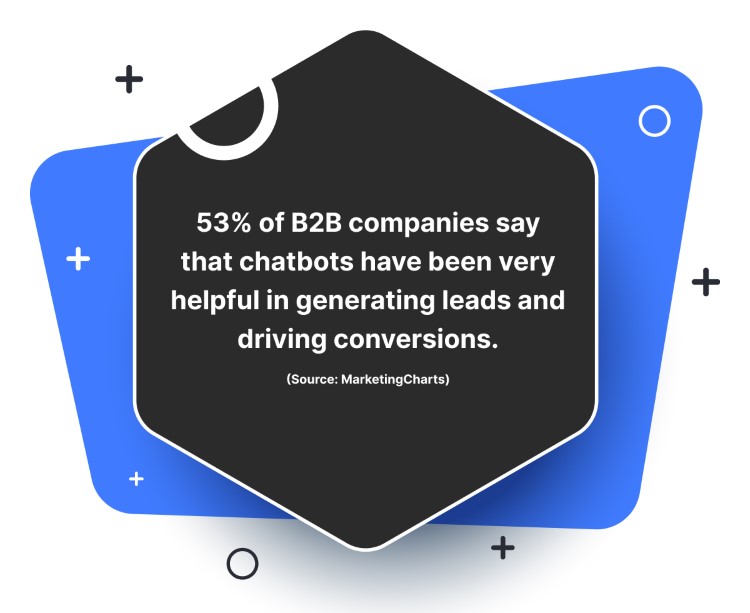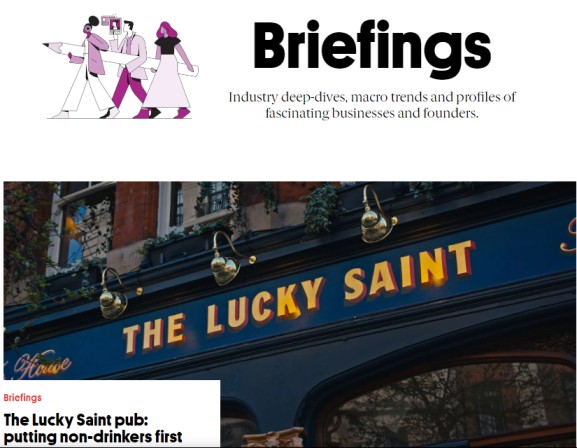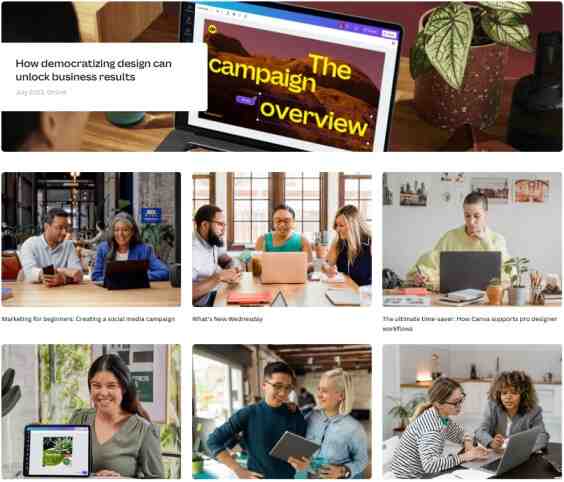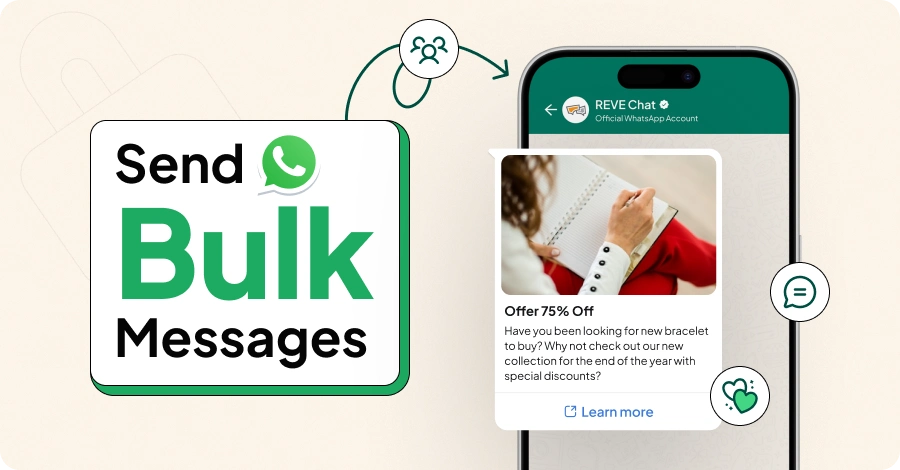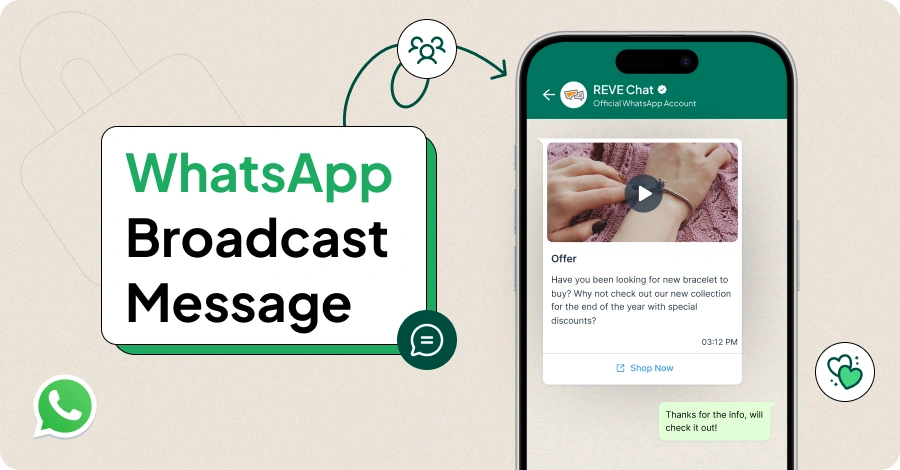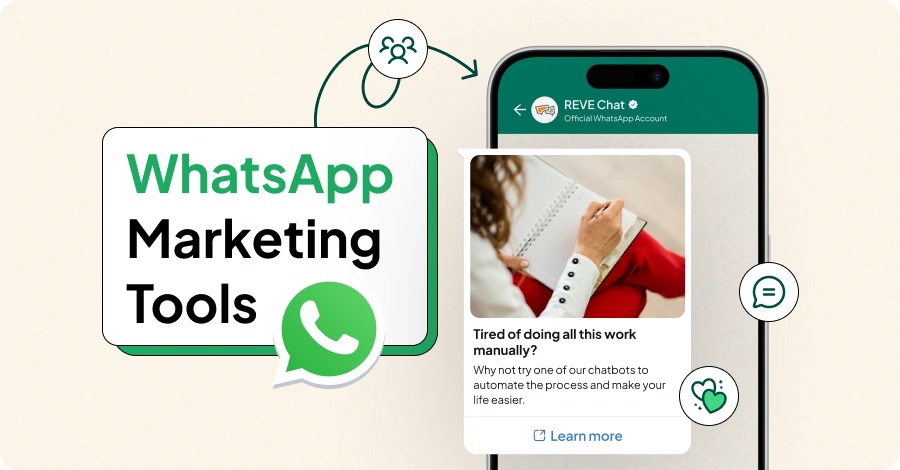A Complete Guide to B2B Marketing – Examples, Strategies & Trends
- July 27, 2023
- 25 mins read
- Listen

Table of Content
As a B2B marketer, you clearly understand how marketing to businesses is significantly different from marketing to individual consumers. You are aware of how marketing to a business means you target an audience that is evolved and that does in-depth research on your messages and offers. Plus, the average buying group consists of 6 to 10 decision-makers in B2B.
All this makes business-to-business marketing complex.
On the other hand, you know marketing is simpler for a B2C audience as you just need to consider individual needs, emotions, and desires. More so, immediate needs are often the biggest driving factor when you do business-to-consumer marketing.
Despite the obvious challenges, you should know how B2B marketing efforts can be hugely successful if you understand the target audience’s needs, pain points, and decision-making process.
In this blog, we will explore B2B marketing in detail, and understand the definition, strategies, funnel, tools, trends, and also look at some real-life examples from the industry.
But first, let’s get started with understanding what B2B marketing is….
What is B2B Marketing?
B2B marketing is a short form for “business-to-business” marketing, and it refers to the marketing activities that are geared towards a business or organization. This type of marketing focuses on promoting offers and building relationships between companies rather than individual consumers.
Key features of B2B marketing –
- Identifying and addressing the challenges faced by other businesses.
- Offering solutions to meet the specific needs and requirements of other businesses.
- Establishing ongoing partnerships and constantly working for repeat business.
- Providing detailed information about the products and services so that the client ( businesses) can get value.
- Customizing marketing messages and offers to meet the pain points of the target business.
How is B2B Marketing Different from B2C Marketing?
B2B and B2C marketing are two distinct approaches to promoting and selling products and services. While both these marketing are similar at many levels, there exist some differences due to the unique target audience and the nature of the purchase decisions involved.
Some of the main differences between B2C and B2B marketing include –
- Target Audience – In B2B marketing, the target audiences are businesses and organizations, so marketing messages need to be directed at people who make purchase decisions. On the other hand, individual consumers are the target audience in B2C marketing and all the marketing messages need to be directed at them.
- Purchase Decision Complexity – B2B purchase decisions involve multiple decision-makers and various expense management strategies that require thorough research and evaluation and therefore, take time. On the contrary, B2C purchase decisions are less complex as individual consumers often make quicker decisions.
- Purchase Volume – Individual consumers often buy single items in smaller quantities, so B2C purchases tend to be on a smaller scale. B2B transactions, however, involve higher quantities of sales and large purchase volumes.
- Relationship Building – Customer retention is a major focus in B2B marketing as marketers look to build ongoing partnerships with clients. Such focus does exist in B2C marketing as well but may not be as critical.
- Nature of Marketing Messages – In B2B marketing, marketing messages are devised to highlight the value they add and the specific problems they solve for businesses. In B2C, the focus of messaging is to do emotional appeals and drive consumer decisions.
- Sales Cycle – B2B marketing has a longer sales cycle as businesses often do extensive searches before making a purchase decision. The B2C sales cycle tends to be shorter with quicker conversions as individual consumers make instant purchase decisions.
What is B2B Marketing Funnel?
The B2B marketing funnel (or the sales funnel) is a complete visual representation of the customer journey that shows all the stages, from the initial awareness to the final purchase. The main purpose of creating a marketing funnel is to outline the different stages that potential B2B clients may follow before being ultimately converted. Using the funnel, a business can know the challenges of each stage and tailor the marketing efforts in a way that helps guide prospects through all the stages.
Here are all the stages of a B2B marketing funnel –
- Awareness – This stage sits at the top of the funnel and includes all potential customers who have become aware of your brand and offers due to your consistent marketing efforts across channels.
- Interest – When potential customers are aware of your brand and offers, the next step for them is to develop an interest in your products or service, and learn more about your business. In this stage, your customers may engage with you with the purpose to be moved down the funnel.
- Consideration – Once your potential customers show interest, it means they will evaluate your offers and also compare them to your competitors. In the consideration stage, prospects research different solutions to fit their problems or needs.
- Intent – At this stage, the prospects have made up their mind and now they have a clear intention to move down the funnel and make a purchase with you. So, chances are high that they might ask for quotes, proposals, or a product demo.
- Decision – By the time your prospects reach the “decision” stage, they are in the process of finalizing your offers. So, they may negotiate with your sales reps, and analyze terms. In this stage, the key is to offer excellent customer service and remove any doubt that potential leads may have.
- Purchase – This stage witnesses the conversion of the prospects into paying customers with key steps such as contract signing, agreement and ultimately making the purchase. But the customer journey does not end as it continues!
- Retention – Now that the prospect has been converted, the key is to work on customer satisfaction, onboarding, and forging long-term relationships. With good retention strategies, you can turn your B2B clients into brand advocates.
Key Components of a B2B Marketing Plan
A B2B marketing plan is a detailed roadmap developed to connect with potential business customers. It outlines the steps and strategies to sell products or services, generate leads, and drive sales. The ultimate purpose of a B2B marketing plan is to have a comprehensive strategy for reaching, engaging, and converting the target businesses into customers.
Here are the key components of a B2B marketing plan –
- Market Research – It involves understanding the target market, their pain points, and challenges, and also analyzing the unique selling points (USPs) of your business for differentiation in the market.
- Goals Setting – It involves setting SMART (specific, measurable, achievable, relevant, and time-driven) goals and ensuring these goals are aligned with the business objectives and offer a clear direction for the marketing team to follow.
- Defining Target Audience – It involves identifying and defining the ideal customers and creating detailed buyer personas for tailoring marketing messages accordingly.
- Crafting Value Proposition Messaging – It Involves conveying the unique benefits of your offers to the target audience and addressing the pain points in the form of unique value proposition messages.
- Marketing Channels – It involves determining the most effective marketing channels to reach the target audience. Those channels could be social media, email, events, content, ads, etc.
- Lead Generation and Nurturing – It involves the development of lead generation strategies and implementation of lead nurturing campaigns to engage with potential customers, gather their key information, and guide them through the sales funnel.
- Measurement and Analytics – It involves measuring the effectiveness of the marketing efforts by establishing KPIs and using analytics tools. Based on the results and tracking, your business will be able to make data-driven decisions.
- Budget and Timeline – It involves setting a clear budget for your marketing plan, allocating resources based on different channels, and creating a timeline to track progress.
- A/B Testing – It involves continuous testing and optimization of various marketing strategies and tactics to see what works best and what does not.
Best B2B Marketing Tools and Platforms For Your Business
B2B marketing tools play a key role in connecting and engaging with your target audience, driving leads and sales, and making your business successful. These tools can offer useful insights into your target audience and make your marketing campaigns more effective. Whether you want to manage your customer database or leverage the power of your website or social media or content marketing, these tools can do all.
Here are the top B2B marketing tools and software for your business –
1. HubSpot
It’s a highly effective B2B marketing tool and is rated among the best in the category. As an all-in-one tool, it brings together inbound marketing, sales, and customer service features to help businesses engage and attract their B2B customers. Using this powerful tool, a business can hugely improve the effectiveness of its marketing efforts and convert customers.
Key Features
- Inbound Marketing Capabilities
- Lead Generation and Management
- CRM Integration
- Marketing Automation
- Reporting and Analytics
- Landing Pages and CTAs
- Social Media Management
2. Unbounce
It’s a popular B2B marketing tool that is widely used for creating and optimizing landing pages and pop-ups. Using this tool, a business can boost conversion rates and generate more leads from marketing campaigns. Its excellent A/B testing and analytics features can prove valuable in improving the conversion rate for marketing campaigns.
Key Features
- Landing Page Builder
- A/B Testing
- Conversion Pop-ups and Sticky Bars
- Integrations
- Mobile Responsiveness
- Dynamic Text Replacement
- Analytics and Insights
3. Ahrefs
Ahrefs is primarily a powerful SEO tool but its tons of advanced features make it a valuable B2B marketing tool as well. Apart from the proven search engine optimization capabilities, it also offers features for driving traffic, boosting online visibility, and contributing to B2B marketing efforts. Using the tool, marketers can understand their competition, optimize their content strategy, and get key customer insights.
Key Features
- Keyword Research
- Competitive Analysis
- Backlink Analysis
- Content Analysis
- Website Audit
- Rank Tracking
- Link Building Opportunities
4. BuzzSumo
BuzzSumo is a quality B2B marketing tool that offers tons of features for businesses to engage with the target audience and stay ahead of the pack. Using this tool, you will get valuable insights and data that can enhance your content marketing strategies and build meaningful relationships with customers. From identifying influencers to social media monitoring to spotting trending topics, it can do a variety of tasks to support your B2B marketing efforts.
Key Features
- Content Discovery
- Competitor Analysis
- Influencer Identification
- Social Media Monitoring
- Content Performance Tracking
- Backlink Analysis
- Audience Insights
5. Salesforce
Salesforce is a very popular CRM platform that can also serve as a solid B2B marketing tool. While it’s known for customer service and sales capabilities, there are several other features and integrations that make it effective for B2B marketing efforts. Apart from managing customer relationships, it also offers features for lead management, marketing automation, campaign management, and social media engagement.
Key Features
- Lead Management
- Marketing Automation
- Lead Segmentation
- Campaign Management
- Social Media Listening and Engagement
- Analytics and Reporting
6. Drip
Drip is an excellent marketing automation platform that can also be used as a B2B marketing tool. It can be used for driving engagement, nurturing leads, and converting prospects into customers. Its email automation and multi-channel capabilities make it a powerful tool for optimizing marketing efforts.
Key Features
- Email Marketing Automation
- Lead Nurturing
- Lead Segmentation and Personalization
- Behavior-Based Triggers
- Multi-Channel Marketing
- Analytics and Reporting
- Account-Based Marketing (ABM)
Benefits of Using B2B Marketing Automation Platforms
More B2B companies now leverage the power of automation to streamline their marketing efforts, improve the efficiency of operations and enhance customer engagement. When B2B marketing automation tools are used, it becomes easy to generate quality leads, build awareness and achieve multi-channel engagement.
Here are some of the key benefits of using B2B marketing automation tools and software –
- Automation does away with the need for manual and repetitive tasks, resulting in time and cost savings on marketing efforts.
- Leads can be tracked and managed easily when B2B automation is used.
- Automation can also help in segmenting the audience based on various criteria and thus paving the way for personalized and targeted communication.
- The use of automation software can help score leads based on the engagement level which improves the overall lead quality.
- Automation helps in the delivery of personalized content and messages to prospects, resulting in better B2B customer experience and higher engagement rates.
- Your business can integrate B2B automation platforms with various marketing channels to maintain consistent messaging and reach where customers are.
- Automation can give valuable insights into customer behavior and campaign performance together with ensuring better collaboration between marketing and sales teams.
- Using automation, B2B companies can run automated email campaigns, do lead tracking and attribution, and achieve automated follow-ups.
Best B2B Marketing Channels For Customer Engagement
Choosing the right channels is vital for the success of your B2B marketing efforts. When you know the right channel, it means you’re aware of where your target audience is and thus, you can send the right message and make communication convenient. A well-rounded B2B marketing strategy combines multiple channels to engage the audience effectively.
Here are some of the most important marketing channels for your B2B business –
- Email Marketing – Email marketing is a highly effective B2B marketing channel that helps businesses engage with their target audience, nurture leads, and drive business growth. It allows for personalized and targeted customer communication and also ensures that leads get relevant content at each stage of the journey. More so, it remains a great channel for delivering various types of content in a cost-effective manner.
- Content Marketing – Content marketing has a big role to play as a B2B marketing channel as it helps in building brand awareness, establishing thought leadership, and driving conversions. Since it revolves around the creation, publication, and distribution of content, brands can leverage its vast potential to attract and engage their target audience.
- Social Media Marketing – For B2B brands, social media channels have become great platforms for connecting with their target audience, generating leads, and fostering relationships. Among the many channels, LinkedIn remains the most beneficial for B2B marketing as it consists of professionals and decision-makers with whom your business can engage.
- SEO (Search Engine Optimization) – SEO is a vital channel for B2B marketing as it helps in improving websites’ visibility and ranking on search engine results pages (SERPs). Your company can use it to attract organic traffic to your website and achieve increased brand visibility. Apart from generating quality leads, SEO is also helpful for attracting a highly targeted audience actively searching for solutions in their niche.
- PPC (Pay-Per-Click) Advertising – When it comes to displaying ads to potential customers, no channel beats the power of PPC. Using pay-per-click ads, a B2B business can reach its target audience, generate leads, and drive conversions. Apart from a targeted reach, this channel is also helpful for quick results and a budget-control way of advertising.
- Webinars and Virtual Events – During the Covid times, a lot of B2B companies realized the power and effectiveness of webinars and virtual events in engaging with the target audience. These channels are excellent for showcasing expertise and generating leads. More so, your company can use them to deliver valuable content, foster connections, and drive business growth.
- Chatbots and Live Chat – The emergence of modern technologies like chatbots and live chat has changed the way customer engagement happens. Both are excellent channels to enhance customer support, respond to queries in real time, and qualify leads. More so, live chat and chatbot benefits are many for B2B marketing including automation, lead generation, etc.
How Can B2B Marketing Services Help Your Business?
Using B2B marketing services will give your business access to a diverse range of marketing expertise and drive growth. From demand generation to customer outreach programs, a holistic approach will ensure that your business enriches from a comprehensive marketing strategy, resulting in measurable and impactful results.
Here are some of the ways B2B marketing services can help your business –
- These services are provided by specialized agencies with extensive experience in B2B marketing, so you can be assured of tailored strategies that will resonate with your target audience.
- Outsourcing your B2B marketing to an expert can contribute to time and resource savings, and your business can thus focus more on core competencies.
- Experts have access to the latest B2B marketing tools and technologies, and they can also leverage advanced analytics and automation to optimize marketing efforts and deliver great results.
- Marketing services can be adjusted to the needs of the size and needs of a B2B marketing client, therefore, ensuring scalability.
- Data-driven approaches are hallmarks of B2B marketing services and this will help you measure the impact of your marketing campaigns and track and analyze KPIs.
6 Effective B2B Marketing Strategies to Grow Your Business
You need a comprehensive and targeted marketing strategy to grow your B2B business. You also need to align your B2B marketing strategies with your business objectives to reach the right audience and drive growth.
Here is a list of the 7 most effective B2B marketing strategies that will hopefully help your business grow –
1. Understand the B2B Buyer’s Journey
Understanding the buyer’s journey is key to tailoring marketing messages and sales efforts to the specific needs and preferences of potential customers. It will help you understand the entire process through which business buyers go through before making a purchase decision. When you are aware of the B2B buyer’s journey, you can easily provide the right information, offer personalized support, and build trust. You can thus also enhance the buyer’s experience and boost the chances of successful conversions.
Key Points to Note
- B2B purchases involve multiple stakeholders and decision-makers, so you should be ready to understand different priorities and address specific needs.
- B2B purchases have longer sales cycles compared to business-to-consumer sales, so you should look to build relationships and nurture leads over time.
- Purchases in the B2B industry are information-driven where buyers rely on heavy research, so you should provide the right content and resources to influence their choices positively.
- It’s important to consider both rational and emotional factors as most of the time, they together influence the decision-making process.
- Conversion is not the end of a buyer’s journey, so you should also prioritize post-purchase customer support and onboarding to forge long-term relationships and win loyalty.
2. Identify Your B2B Target Market and Audience
While a buyer’s journey gives information about potential customers, you’re still not sure who you’re marketing to specifically. You need to decide who will purchase your products or who will take the buyer’s journey. So, the key is to identify your target audience, but before that, you need to know the target market.
You need to know many things for identifying the target audience, including –
- You need to know the size of the company
- You need to know the specific region and location
- You need to know the industry your potential client belongs to
- You also need to know its employees’ strengths and revenue
Once you get a fair idea about the target market, the next step is to understand the target audience. After all, you are going to market your products to individuals, aren’t you?
To know the target audience, you need to do many things, including –
- Use demographic and psychographic data
- Know the age, location, and job title
- Get information about the habits, beliefs, behaviors, and motivations of the target audience
Based on all the information you have, you can create buyer personas and customer profiles that will help you decide the right marketing strategy to target them.
3. Define Your Marketing Mix
What comes after you have identified your target market and target audience? Well, the next step is defining and choosing your marketing mix. It means you need to specify your 4Ps of marketing so that you can tailor your marketing strategy effectively.
Source
Here are the 4 Ps of B2B marketing –
- Product – Understand the specific needs of your target market and then develop products ( or services) that address those needs effectively.
- Price – Determine the pricing strategy for your offerings after considering key factors such as negotiation, volume discounts, and duration of the contracts.
- Place – Know the right channels to use for taking your products to B2B customers, or choose the channels where you think you will find your target audience.
- Promotion – Decide the right promotion strategies and activities to reach and engage your B2B audience.
In order to create a more robust marketing strategy, you first need to define your 4 Ps as it has all the information regarding your product and customer. From this stage, you can move on to the execution part of a more effective strategy.
4. Create an Elaborate Marketing Plan
You now move to the stage of creating a marketing plan which will work as a detailed roadmap to connect with potential business customers. This plan will have all the steps and strategies to sell products or services, generate leads, and drive sales. It will give you a comprehensive strategy for reaching, engaging, and converting the target businesses into customers.
When you create a marketing plan, you first need to do market research into the pain points and challenges of the target market followed by setting measurable goals. In this stage, you will craft value proposition messaging and settle on lead generation & nurturing activities. You will set a budget and timelines and then measure the effectiveness of the efforts.
5. Conduct a Competitive Analysis
When you’re in the B2B market, the key to success is to know what your competitors are up to and what is ticking for them. Running a competitive analysis will also give you a good idea about whether your marketing strategies could be as effective.
Key Things to Do with Competitive Analysis
- Make a list of your main competitors and gather detailed information about each.
- Compare your product’s features, benefits, and USPs against your competitors.
- Evaluate the pricing strategies of your competitor and see if yours need adjustments.
- Analyze the distribution channels and review the marketing tactics used by your competitors.
- Identify the strengths and weaknesses of your competitors and know the opportunities and threats for your product.
- Do a SWOT analysis to understand your own standing in the market.
- Devise an action plan.
6. Determine Your Brand Positioning
Now when you have run a competitive analysis, you would have a fair idea of how to position your brand in the market. You will have understood how to align the brand’s identity with the needs and perceptions of your target audience.
To determine your brand positioning, you need to do the following –
- Determine the personality of your brand and the tone you want to convey.
- Define your core values and principles.
- Create a clear positioning statement that states your brand’s unique value.
- Make sure the brand positioning you do is consistent across marketing channels.
Top B2B Marketing Trends to Watch Out
The current B2B marketing landscape is more complex than it has ever been before. Marketers are witnessing newer challenges that are refining the market in a big way. With the focus gradually shifting to leveraging the most advanced tools and technologies around, it was only a matter of time before the traditional boundaries stood shaken. All this has led to the emergence of top trends.
1. Chatbots are becoming a key element of B2B marketing
In recent times chatbots have become a vital element in B2B marketing as they offer several benefits to businesses. Whether a business wants to engage with its audience or provide personalized support, bots can handle all with ease. More so, well-designed chatbots with AI capabilities have transformed the way marketing is done in the B2B market.
Why Chatbots are Hot Trends?
- Chatbots can stay 24×7 and offer instant responses to customer inquiries and support requests.
- They can qualify leads based on set criteria and capture customer info for follow-ups.
- The use of AI technology makes chatbots even more powerful in terms of analyzing data and interactions and giving personalized responses and recommendations to users.
- AI-powered chatbots can guide leads through the funnel and offer them relevant information at each stage of the journey.
2. Podcasts are turning into popular channels
Many B2B firms now understand the potential of podcasts to reach their audience and connect with them in an engaging manner. With marketing podcasts, marketers find a medium to share thought leadership and showcase their offerings to the target audience. More so, this channel gives the opportunity to connect with the audience on a deeper level. The best part, 4 out of ten top leaders, department heads, VPs, and owners listen to podcasts, making it a very beneficial channel for marketing.
3. Video marketing will continue to surge in popularity
As a B2B marketer if you think video marketing has saturated as a channel, think again. This channel has way more to give than you could imagine. Your target audience laps up quality videos and they are in no mood to change their taste anytime soon. More brands look to leverage the power of YouTube and Vimeo platforms as they know that the thirst for visual content is huge.
4. Account-based marketing is gaining more traction
More B2B marketers now realize the benefits of targeting specific accounts rather than chasing a broader audience. This realization is the reason fuelling the growth of account-based marketing (ABM). With this approach, brands can tailor their content and messages to specific needs, resulting in higher conversion rates. All this is the reason why ABM is also driving a more personalized experience for the target audience.
B2B Marketing Examples
1. Mailchimp
While most brands are aware of the power of content in engaging and connecting with the target audience, not many are able to tap into that. Mailchimp is an exception though as it knows how to use the content to keep the target audience hooked and up-to-date on the latest trends.
Mailchimp’s Briefings section does not focus on just creating content around email marketing, but it chooses topics that could interest the wider tastes of the audience who could potentially use Mailchimp for their email marketing campaigns.
2. Philips
There is no denying the fact that influencer marketing is now a big part of the B2B marketing mix and the chances of success are greater when you find the right influencers. When one of the world’s top electronics companies, Philip, can bet big on influencers, it means this marketing channel has more potential than imagined.
It first created a digital command center and then tracked three groups of social users, including the “influencers” for engagement purposes. This helped reduce the marketing spend and achieve better ROI.
3. Canva
Marketing is all about reaching the target audience, piquing their curiosity about your products, and raising their interest in your brand. To achieve these goals, brands have their own unique ways but what Canva did is truly remarkable – it chose to show people the power of its tool and this strategy worked big time.
Its Canva Events include webinars, workshops, and Q&A sessions that center around using its products and doing all the amazing things.
4. FedEx
For a logistics company, you’d assume that it has limited ideas about how to market the brand. But if the company is FedEx, you know it can turn the logic upside down and it did in a remarkable manner. It chose to make a big splash on social media and the strategy paid rich dividends. The best part, it ensured an immersive travel experience for its followers by using various photos showing Fedex in exotic locations and all that turned their social feed into a travelog.
Strengthen Your B2B Marketing Efforts With REVE Tools
Effective B2B marketing is all about combining the best tools and technologies to connect with the audience and convert. At REVE Chat, we realize the value of using the power of technology to boost connections and drive conversions.
We have a variety of support and engagement tools that a B2B business can use and enhance its marketing efforts. Our AI-powered chatbot can help automate various tasks across sales, marketing, and support.
More so, using our video chat software and co-browsing software can help brands provide the best visual support to clients. Plus, our live chat software can be paired with the chatbot to provide hybrid support and enhance the user experience at each stage of their journey.
Final Thoughts
B2B marketing may be challenging but a clear strategy and the right tools can make it incredibly rewarding for your business.
With REVE Chat, you can find the best engagement and support tools to get value out of your B2B marketing efforts.
So, you can sign up here and see how our products can add value to different aspects of your marketing endeavors.

